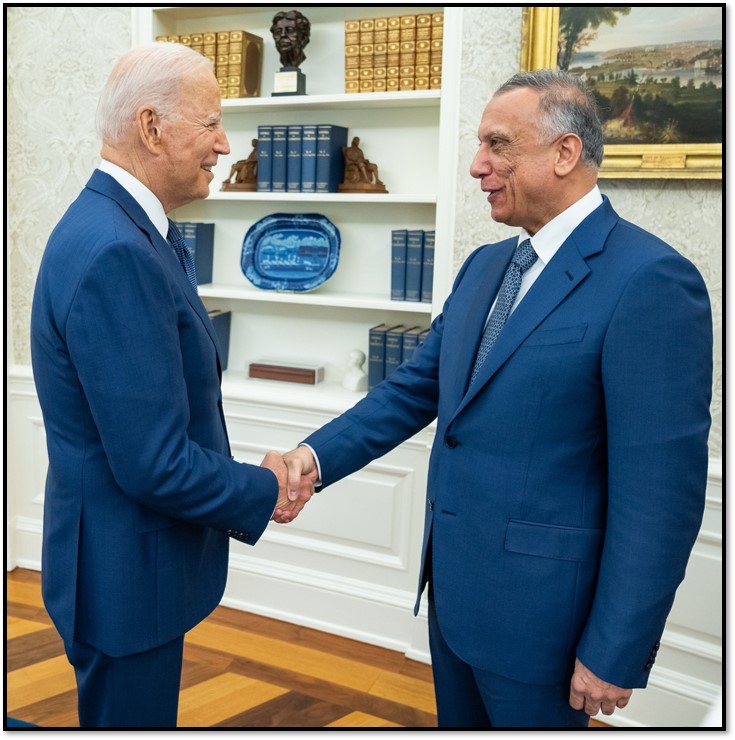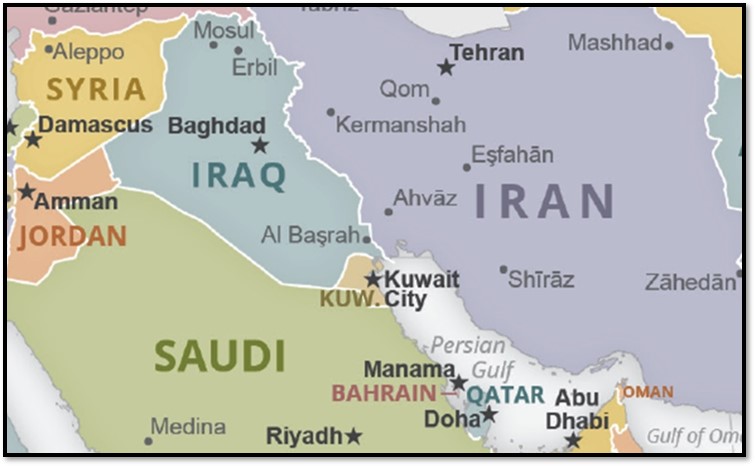
Iraqi Prime Minister Mustafa al Kadhimi met with President Joe Biden on July 26 for the U.S.-Iraq Strategic Dialogue. The United States committed to removing all combat troops by the end of 2021. The two leaders also spoke about attacks by Iran-backed militias on U.S. troops and diplomatic targets in Iraq. Kadhimi subsequently met with a small group of American reporters. Kadhimi emphasized that Iraq has tried to defuse escalating tensions between Washington and Tehran. “We were very direct toward both parties that we do not accept Iraq to become a battleground,” he said. “And we work to achieve calm despite that. There were some violations by some outlaw groups—towards which we took measures. We fought and conducted arrests against some of these groups.” The following are excerpts on Iran-U.S. tensions.
Why is it that your government has not been able to stop the attacks on American targets?
Regarding the government not fulfilling its duty against those who carry out attacks, this has some space for discussion. The Iraqi state was on the verge of collapse when I took over. I was accused by certain political forces that I conducted security coups when I actually made some changes in some security organizations' leadership. Despite these measures, these organizations require time until they actually restore their strengths, their powers, and their ability to control criminals.
Some operations did take place, attacks against diplomatic missions and Iraqi bases. Some other operations were actually foiled preemptively before they took place against diplomatic missions or Iraqi bases hosting international coalition personnel. And we have dozens of detainees because of these operations. Some rockets were fired, not to put pressure or to target diplomatic missions—the U.S. embassy, U.S. personnel in military bases—but they were actually aimed at putting pressure on the government to release detained individuals who were accused of conducting similar activities.
Why has your government not been able to stop the shipments of missile parts and weaponry that is going from Iran across Iraq into Syria?
 About the smuggling of weapons of Iran to Syria, I would disagree with you. The proportion of this trafficking significantly went down. And there a lot of people complaining because we are actually obstructing this traffic. I would like to invite you to come to Iraq to see how much progress we achieved on the Iraqi-Syrian border. I am prepared to accompany you there, and we can compare how it was in the past and how it is now.
About the smuggling of weapons of Iran to Syria, I would disagree with you. The proportion of this trafficking significantly went down. And there a lot of people complaining because we are actually obstructing this traffic. I would like to invite you to come to Iraq to see how much progress we achieved on the Iraqi-Syrian border. I am prepared to accompany you there, and we can compare how it was in the past and how it is now.
I carry out detentions every day against those who are smuggling weapons between Iraq and Syria. Maybe there are shortcomings, yes, that's possible. But we are seriously working to prevent such activity.
More broadly, a number of us would be interested in your reflections on how powerful Iran is in Iraq? How much pressure do you feel from your neighbor?
We are working to establish elements of calm.
Following up on that point, you have met with senior Iranian leaders. Have you requested Iran's assistance in stopping the attacks on rocket, drone, and other attacks on American personnel in Iraq or restraining the groups Iran supports from carrying out those attacks? And what was the Iranian response? Or is it your belief that Iran has lost control over some of these groups after the killing of [Quds Force leader] Qassim Soleimani? And lastly, do you have any assurances from any of the resistance factions that the harassment campaign against U.S. personnel will stop after the ending of the combat mission, or should the U.S. expect this to continue?
We are in the Middle East. Usually, the course of events imposes their results. What happened today, the joint communique between us and the United States, enjoyed national consensus, almost full national consensus from all parties. There were statements made by all entities, whether Shia or Sunni. This has given a boost of legitimacy to this relationship, and we've always described such attacks as illegitimate and illegal. This position by Iraqi national entities and parties actually gave support for this direction.
We are talking to all sides in order to put a limit to activities by these outlaw groups. I am not the preferred person or prime minister for these groups. This is why attacks against me are still ongoing until this actual moment. We speak to Iranians and others in an attempt to put a limit to these attacks which are undermining Iraq and its role. And we hear opinions that are negative and that are not in support of these operations.
Have you asked these groups to stop their attacks and have they responded? Do you believe that these groups are controlled by Iran, or do you think that for some of these groups have lost control because of Qassim Soleimani's death and [Abu Mahdi al] Muhandis' death?
Regarding these groups, we always confront, fight, these behaviors. We deal with these groups according to their behavior and their actions. Whether someone lost control or not, we only care about what they eventually do, and we deal with their activity as illegal actions. Regarding the agreement we reached with the United States about the level of this relationship, it is pursuant to an already established roadmap or policy and transitioning between phases of the relationship. So we went all the way from phases one, two, three and now from four to five. The Iraqi troops are now ready to play their full role in defending Iraq against terrorist groups.
Did you get any pressure from President Biden to do more to crack down on the Shia militias that are attacking U.S. forces?
Our relationship with all of our friends relies on seeking common interests. We were under no pressure from the U.S. administration or President Biden himself. The Iraqi government has an obligation to provide protection for international coalition personnel and U.S. trainers and advisers. With partners, with allies, we talk about joint challenges and how to solve these joint challenges together with the spirit of partnership, not the spirit of pressure.
We fully understand American concerns about the need to protect their sons and daughters who are in Iraq. And we are working to provide necessary protection for all members of the international coalition, including the Americans in Iraq. This is primarily, particularly, an Iraqi task.
Do you expect the United States to carry out more unilateral strikes against militias in your country because of the perception that not enough has been done?
We've made an effort to combat these groups. There is a need to respect our sovereignty and respect the peculiarity of each side, specially that we are carrying out our responsibilities whenever any of these groups carry out a threat against Iraq's security or the security of Iraq's friends.
Did you seek any agreement from President Biden that if there is another attack on U.S. forces, that the United States will not respond directly with airstrikes or in some other way? Is that part of the deal that they are no longer in a combat role?
We are responsible for protection of anything that happens on Iraqi soil. The coalition is stationed inside Iraqi military bases, so it is an Iraqi responsibility to protect.
I'm sorry, was that a “yes” in terms of you asking for that commitment?
Can you guess? We are responsible for the protection of all Iraq's guests. These guests are there to support us and to enhance or strengthen our capabilities.
Do you view your country and Syria as up for grabs in the United States in their negotiations with Iran?
We need to work together, all of us, Iraqis, Iranians, Americans, all the regional players as well, to achieve stability in the region. America, the United States has a major moral responsibility in achieving stability in the region. It’s a superpower.
In the next five or 10 years what you see the U.S. presence looking like in Syria. Does it look like no U.S. troops?
For sure, regional countries seek to achieve a level of stability in which they don't require foreign troops on their soil - when there is stability and peace. We have to understand that sometimes wars bring others into other people's territories, and this is understandable. We should seek opportunities to avert further escalation in the region and further opportunity to bring in foreign troops into it.
Could you talk about the Iran nuclear deal situation. It’s not looking good right now between the U.S. and Iran on the nuclear talks. And if they don't come to a deal, I was curious how you think that would affect dynamics in the region?
Let's give an opportunity for the talks in Vienna, especially that we are hearing talks about another session after President Raisi assumes power.
